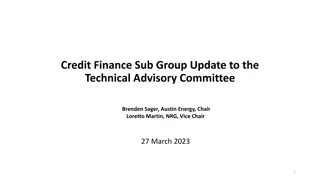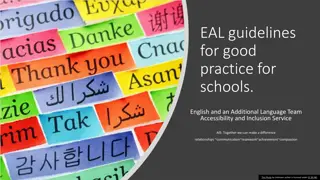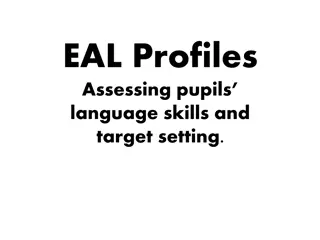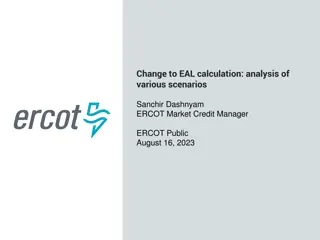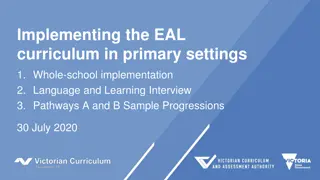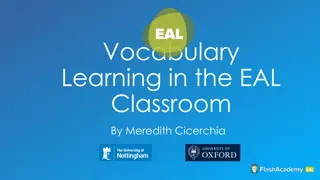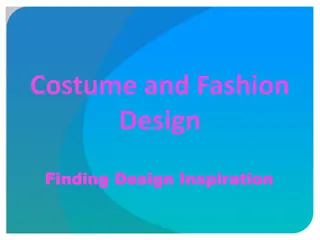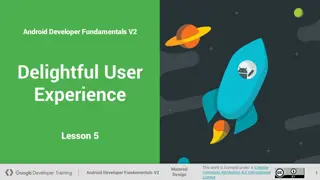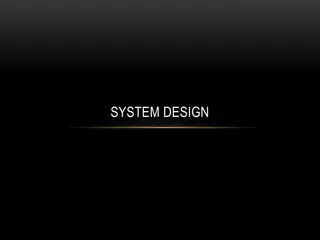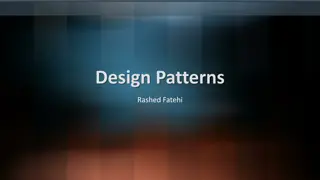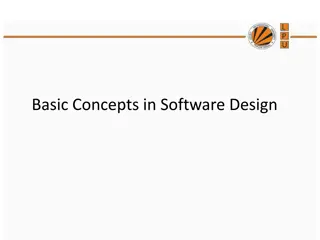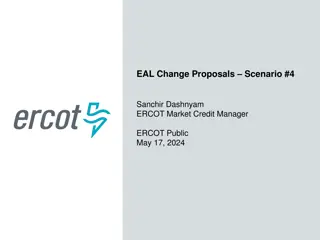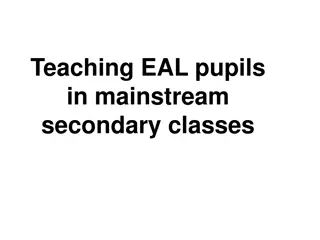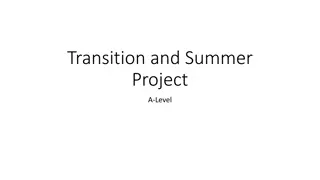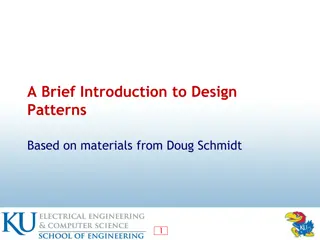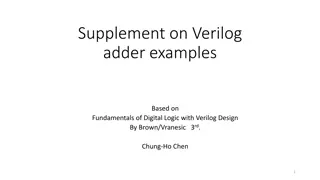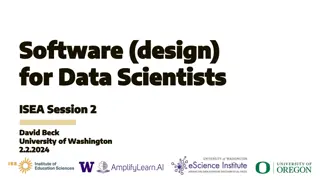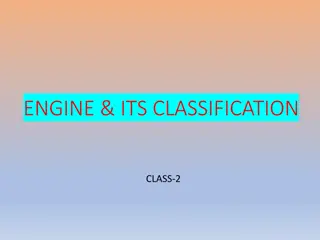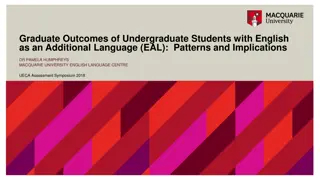Credit Finance Sub-Group and NPRR Updates
Updates from the Credit Finance Sub-Group include discussions on operational NPRRs, new invoice reports, EAL changes, and DC Energy's exposure calculations. The group considered improvements in credit implications, concentration limits, and more. NPRR 1186 was reviewed for enhancements to ESR monito
0 views • 12 slides
Supporting Strategies for English as an Additional Language (EAL) Learners
Strategies and examples are provided to support new EAL students in the classroom, including creating an inclusive environment, utilizing non-verbal aids, pre-teaching vocabulary, offering additional literacy support, and promoting vocabulary building through games. The importance of essential vocab
2 views • 11 slides
Understanding Software Analysis and Design Process
Software analysis and design involve a systematic approach to understanding user requirements, creating logical models, and transitioning to detailed design specifications. Requirements analysis focuses on capturing system requirements, while design translates these requirements into implementation
7 views • 16 slides
Addressing Double Counting and Design Flaws in Energy Market Exposures
Severe over-collateralization and under-collateralization in the energy market expose participants to financial risks. Flaws in the current EAL design, regarding DC Tie Exports, result in mismatches between calculations leading to excessive collateral calls. Correcting these flaws is crucial to prot
2 views • 14 slides
English ITT Mentors Meeting on 29th June 2023 Review & Reflection
The English ITT Mentors Meeting held on the 29th of June, 2023 covered a review of the year, completion rates of the 2022-23 English cohort, first posts of trainees, in-year changes to the training program supporting EAL pupils, and reflections from an English trainee on the challenges and growth ex
3 views • 19 slides
Credit Finance Subgroup Update to Technical Advisory Committee - March 27, 2023
The Credit Finance Subgroup provided updates on operational NPRRs, discussed EAL Change Proposals, and clarified obligations for Distribution Service Providers regarding ESI ID provision. They also discussed Independent Amount Posting requirements and clarifications to the DAM and Energy-Only Offer
0 views • 15 slides
Credit Finance Sub Group update to the. Technical Advisory Committee
Updates from the recent ERCOT Credit Finance Sub-Group meeting include discussions on voting matters, operational NPRRs without credit impacts, new invoice report implementation, and evaluation of changes to the Letter of Credit Concentration limits. Additionally, NPRRs related to State of Charge wi
0 views • 11 slides
Effective Communication with Parents Regarding CAT4 Assessment Results
Sharing CAT4 data with parents is crucial in keeping them informed about their child's academic needs and progress. Before discussions, ensure parents are aware of the assessment, allocate time for questions, and understand the reports. Be prepared to answer common questions about CAT4 and reassure
0 views • 9 slides
EAL Guidelines for Schools: Enhancing Accessibility and Inclusion
Navigate effective guidelines for English and Additional Language teams in schools, focusing on fostering relationships, communication, teamwork, achievement, and compassion. As part of the Accessibility and Inclusion Service, together we can make a difference.
3 views • 64 slides
Comprehensive Overview of EAL Profiles and Strategies for Language Skills Assessment
EAL Profiles offer a versatile tool for assessing pupils' language skills and setting targets. They can replace Form 1 documents, aid in transition planning, update progress profiles, and inform teaching strategies. These profiles include sections for pupil information, progress overview, review tab
0 views • 10 slides
Guidelines for Design of Cement Concrete Pavement and Interlocking Paver Blocks
This document provides guidelines for designing cement concrete pavements and interlocking paver blocks, covering factors governing design, wheel loads, design period, subgrade characteristics, approximate k values based on CBR values, and the importance of a sub-base below concrete pavements. It em
0 views • 67 slides
Software Engineering Design Principles and Concepts
The chapter discusses the essential principles and concepts in software design, highlighting the four key design models - data design, architectural design, interface design, and component-level design. It emphasizes the importance of traceability to the analysis model, minimizing the gap between so
0 views • 36 slides
Analysis of Change in EAL Calculation Scenarios
In this analysis, Sanchir Dashnyam, the ERCOT Market Credit Manager, discusses the change in the EAL calculation formula, exploring different scenarios and their impacts on ERCOT markets. The scenarios involve adjustments to the application of RFAF against various parameters, aiming to optimize the
0 views • 7 slides
Implementing EAL Curriculum in Primary Schools: A Comprehensive Guide
This comprehensive guide explores the whole-school implementation of the English as an Additional Language (EAL) curriculum in primary settings. It includes insights on assessing student learning data, aligning teaching programs with the new curriculum, setting goals, and integrating EAL support wit
0 views • 34 slides
Social and Linguistic Interaction of EAL Learners in Overwatch
Exploring the unique communication challenges and opportunities for English as an Additional Language (EAL) learners in the multiplayer hero shooter game, Overwatch. The study focuses on the team dynamics, language learning affordances, and social interactions within the game, shedding light on the
0 views • 17 slides
Importance of the New Victorian Curriculum F-10 EAL
The new Victorian Curriculum F-10 EAL aims to establish EAL as a standalone curriculum, provide a consistent structure across all learning areas, and recognize the diverse backgrounds and learning experiences of EAL students in Victoria. It also focuses on supporting the specific needs of EAL studen
0 views • 29 slides
Effective Techniques for Vocabulary Learning in the EAL Classroom
Understanding the significance of vocabulary in Language acquisition, knowing which words to teach, the various facets of word knowledge, methods to validate a student's word mastery, and diverse approaches to vocabulary learning all contribute to an enriched learning experience in the EAL classroom
0 views • 14 slides
Improving Accessibility: Innovative Solution for Pupils with Hearing Problems
Addressing the issue of hearing problems in pupils, this solution offers a unique approach using technology. It highlights the challenges faced by children with hearing impairments and provides a comprehensive solution that includes the utilization of software and services like Amazon Polly and Tran
0 views • 17 slides
Understanding System on Chip (SoC) Design and Components
Explore the world of System on Chip (SoC) design, components, and working flow. Learn about Intellectual Properties (IP), platform-based design, typical design flows, top-down design approach, and the emerging Electronic System Level (ESL) design flow. Discover the essential components of an SoC, su
0 views • 45 slides
Exploring Design Inspiration and Elements in Costume and Fashion Design
Dive into the world of costume and fashion design through a visual journey of finding design inspiration, understanding the design process, emphasizing originality, and exploring different sources of creativity. Discover how technology, art, food, history, architecture, and nature can spark innovati
0 views • 45 slides
Enhancing Piping Design Efficiency with Spec-Driven Technology
Explore how Spec-Driven Piping technology powered by CADACTIVE offers a standardized approach for piping design in Creo Parametric. This innovative extension streamlines design communication, eliminates errors, and improves design efficiency by utilizing a master catalog, automated checking capabili
0 views • 15 slides
Material Design: Combining Classic Design Principles with Technological Innovation
Material Design is a design language that combines traditional design principles with the possibilities offered by technology and science. It emphasizes visual language, classic design elements, and innovation to create delightful user experiences. The Material Metaphor, Imagery, Typography, Color,
0 views • 34 slides
Comprehensive Guide to System Design Components and Techniques
System design involves the detailed planning and identification of components in an information system, aiming to provide users with a general understanding of the new system. This process includes techniques like flowcharts, prototyping, and component design, covering aspects such as output design,
0 views • 24 slides
Understanding Design Patterns: A Comprehensive Overview
Exploring the world of design patterns, this content delves into the essence of design patterns, their application in software design to resolve complexity, and the different types of design patterns - creational, structural, and behavioral. It also showcases examples of popular design patterns such
0 views • 22 slides
Implementation of Pupil Equity Funding at Lundavra Primary
Lundavra Primary in Fort William, opened in 2015, amalgamated from three schools, serves a diverse student population with 15% on free school meals and 19% living in SIMD 2 areas. The implementation process involves identifying gaps through data tracking, analyzing pupil equity data, and addressing
0 views • 15 slides
Comprehensive Overview of EAL Support and Attainment in Shropshire Schools
Comprehensive information on EAL support in Shropshire schools from 2018, including definitions of EAL pupils, learning timelines, attainment statistics, and strategies for effective support. The data covers EYFS, KS2, and KS4, highlighting the gaps in achievement based on the year of arrival and em
0 views • 16 slides
Understanding Basic Concepts in Software Design
Software design involves transforming customer requirements into a form suitable for implementation, with activities categorized into preliminary and detailed design stages. High-level design focuses on module identification and control relationships, while detailed design entails defining data stru
1 views • 24 slides
ERCOT Market Credit Manager Proposal Analysis
This document outlines EAL change proposals scenarios for ERCOT Market Credit Manager, including definitions of invoice exposures, current EAL formulas, and various scenarios affecting the calculation. It covers invoice exposure definitions, current EAL formula versus scenarios #1, #1a, and #1b, as
0 views • 11 slides
Challenges and Support for Teaching EAL Pupils in Mainstream Secondary Classes
Teaching English as an Additional Language (EAL) pupils in mainstream secondary classes poses significant challenges for educators. Issues such as teacher preparedness, classroom support, and training are highlighted, emphasizing the importance of meeting the diverse learning needs of all students.
0 views • 50 slides
Exploring 3D Design and Critical Analysis in Architecture
Dive into the world of 3D design and critical analysis with a focus on architecture. Discover the stages of design, essential skills for designers, and areas of study in three-dimensional design. Delve into iconic buildings like Frank Lloyd Wright's Falling Water, analyze their key features, and eve
0 views • 9 slides
Understanding Design Patterns in Object-Oriented Design
Design patterns in object-oriented design (OOD) are essential templates that codify best practices for solving common problems. They help streamline development by capturing proven design decisions, promoting code reuse, and enhancing system flexibility and modularity. Learn about the core concepts,
0 views • 20 slides
Understanding Interaction Design in Human-Computer Interaction
Interaction design focuses on creating interactive products that are easy, effective, and enjoyable to use. It aims to reduce negative user experiences while enhancing positive ones. Designing interactive products requires understanding user activities, interfaces, and device arrangements to support
0 views • 11 slides
SE2811 Software Component Design Overview
This course covers software component design, design patterns, object-oriented design, algorithms, and opportunities for reuse in systems design. It emphasizes the importance of domain-level design and provides insights into solving core problems through reusable classes.
0 views • 21 slides
Analysis of Bunch Lengthening in CEPC for Different Design Parameters
This study explores bunch lengthening in the Circular Electron Positron Collider (CEPC) for various design parameters, analyzing a 54 km design scheme, a 61 km design scheme, and a 100 km design scheme. The analysis includes the theoretical framework used, equations for bunch lengthening, and conclu
1 views • 15 slides
Understanding Plain & Reinforced Concrete Structures in Design Engineering
In the design of Plain & Reinforced Concrete structures, various strength design methods such as Ultimate Strength Design (USD) and Allowable Strength Design (ASD) are utilized. These methods involve factors of safety, material strength, load factors, and analysis in the elastic range. Additionally,
0 views • 11 slides
Verilog Adder Examples & Typical IC Design Flow
This comprehensive content delves into Verilog adder examples, typical IC design flow, physical design considerations, and examples of OpenGL ES GPU and ARM hypervisor applications. It covers the fundamentals of digital logic with Verilog design, hardware description language, FPGA prototyping, phys
0 views • 27 slides
Understanding the Importance of Software Design for Data Scientists
Today's ISEA Session 2 with David Beck from the University of Washington delves into the critical role of intentional software design for data scientists. The session covers the software design approach, user-centric design stories, use cases, components, testing strategies, and the benefits and dra
0 views • 76 slides
Supporting Pupils with English as an Additional Language (EAL) - Strategies and Insights
Understanding and supporting pupils with English as an Additional Language (EAL) is essential for educators. Prue Reynolds, an EMA consultant, emphasizes the importance of recognizing the diversity and unique backgrounds of EAL learners. The materials provided offer insights into identifying EAL pup
0 views • 29 slides
Understanding Engine Classification and Design
Engine classification involves categorizing engines based on various factors such as combustion type, number of strokes, cylinder design, and ignition method. Common classifications include external and internal combustion engines, as well as categories based on the design and use of the engine. Add
0 views • 11 slides
Graduate Outcomes of Undergraduate Students with English as an Additional Language (EAL): Patterns and Implications
This research study conducted by Dr. Pamela Humphreys at Macquarie University's English Language Centre focuses on the graduate outcomes of undergraduate students with English as an additional language (EAL). The study explores patterns and implications of these outcomes, analyzing factors such as E
0 views • 43 slides





